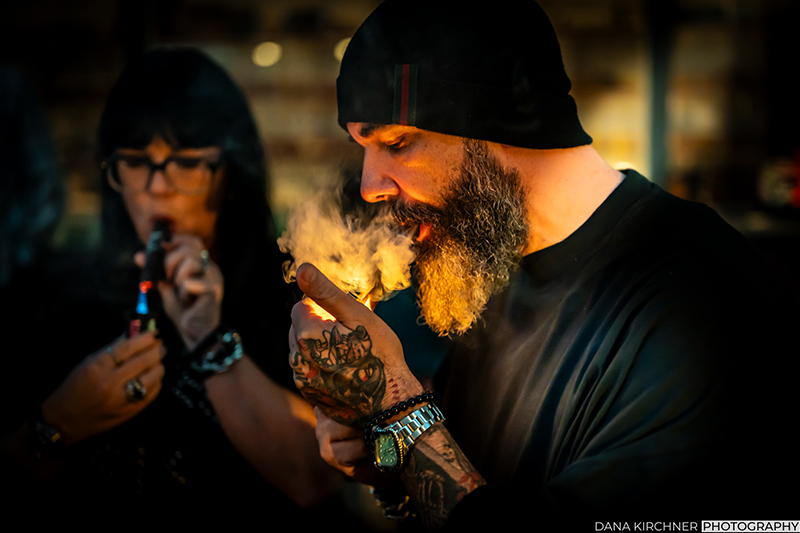Inspired by the world of fashion and spirits, where the “label” is the centerpiece of the brand, Black Label Trading Company has been turning heads since it was launched by James and Angela Brown in 2013.
This is not your grandfather’s traditional take on a cigar brand. Instead, the Browns’ company is an avenue for James to express his creativity. The artwork seen on the cigar bands is the work of James himself. Fabrica Oveja Negra, the Nicaraguan cigar factory owned by the Browns, is designed to look and feel more like an art studio than a factory. Black Works Studio, an offshoot of Black Label Trading Company, is a cigar brand created to allow the Browns to create and release cigars highlighting cigar-making’s artisanal qualities while not fitting perfectly into the Black Label Trading Company brand.
When looking at the business the Browns have built in the tobacco industry, one can see the extra steps the couple has taken to do things differently. It’s reflected in the cigars their factory produces, the brand and lifestyle they express, and in their cigar artwork. Where some try hard to fit into the industry, the Browns have firmly defined their place in the industry by having the courage to do things differently.
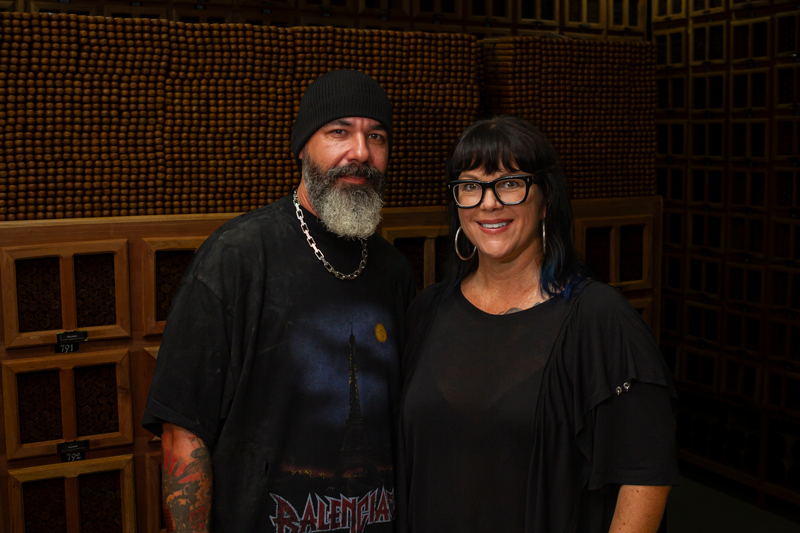
Nicaraguan Origins
Black Label Trading Company has done things differently from most companies from the very beginning. It is also part of the brand’s origin story. Before they started Black Label Trading Company, James and Angela Brown were very familiar with business and entrepreneurship. The couple traveled the world and launched several different businesses. If they had an idea for a business, they were the type to pursue that idea and turn it into a reality. While they were living in Guatemala and running an adventure travel company, the idea for a cigar business came to mind.
“I had been a cigar smoker since I was about 18. We hadn’t lived in the States for over a decade at that point. We had no involvement in the cigar community in the U.S. at all. We didn’t know any cigar retailers; we didn’t know any cigar reps; we didn’t have a group of cigar friends. So, during the time that we were running the travel company, we had the opportunity to travel to Nicaragua. A lot of our customer base were cigar smokers, so we decided to start including Estelí as a travel destination,” says James Brown.
“The more time I spent there, the more I got into the manufacturing and growing process,” he adds. “What I found was that the tobacco I was smoking in Nicaragua was very different from the cigars I was able to get from Nicaragua. I felt like the cigars I was getting at that time were a little monotonous. I felt like I had smoked that same cigar several times, and they didn’t have the boldness and intensity that I was loving about the tobacco that I was finding in Nicaragua.”
With the seeds of an idea for a future in the cigar business firmly planted in the Browns’ minds, James started spending as much time as he could learning about the industry. He learned all he could about tobacco, cigar blending and how cigars are made. After a few years of personal study, the Browns began making cigars for their travel business customers. What started as another feature to set their travel business apart from others soon paved the way for something even grander—their very own premium cigar brand.
It’s Not Just a Brand
The Browns were building a cigar business and brand in an unusual way. Where many had some history in the industry, either from working for a cigar company or for a retailer, the Browns had none of this. Instead, they got their start as a travel business that explored the cigar culture and industry in Estelí and began making cigars to be shared with their customers. There was much to learn about the business of cigars, but they did not let the unknowns keep them from building a tobacco business for their own.
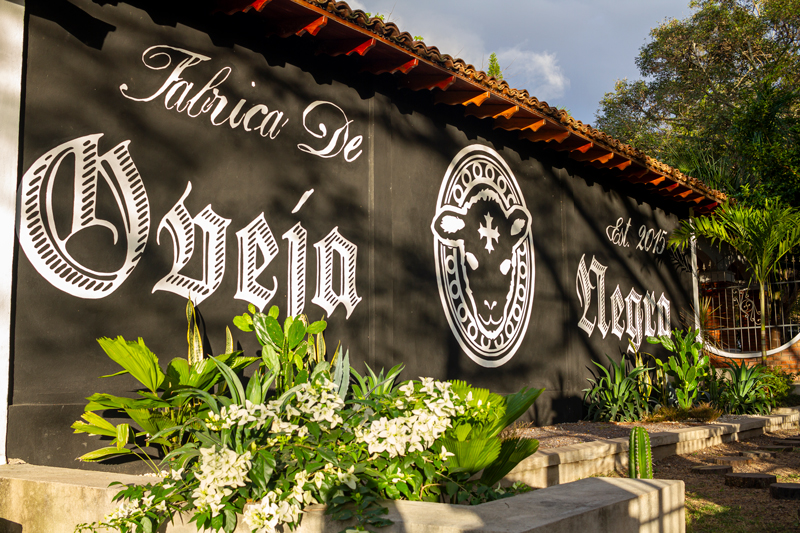
“Ignorance is bliss,” Angela Brown says. “I think if we had known the other side, maybe we wouldn’t be here now.”
When it came time to create a cigar brand, James had a lot of ideas. He had a personal style and penchant for fashion that he wanted reflected in the brand he and his wife were building. “When I walked into a humidor as a consumer, there wasn’t really anything in there that spoke to me,” James explains. “The intention was to apply this idea to the brand: ‘I’m not the only one out there who must feel this way.’ I wanted to put out cigars that represented what I loved about Nicaraguan tobacco, which was that kind of big, bold, more intense profile.” Black Label Trading Company was born.
It was 2013, and the Browns had samples to hand out, but no retail customers. They decided to start in their home state of Texas, taking samples of their cigars directly to retailers. “We didn’t know anybody in the U.S., and we were from Texas, so we figured we should start there,” says James. “I would get on an airplane and go knock on cigar shop store doors like a vacuum cleaner salesman. I was like, ‘Please, try my cigar!’”
Slowly but surely, retailers began bringing Black Label Trading Company into their stores, and their customers started taking notice, just as James had hoped. With social media catching on in the cigar community, James and Angela started noticing more cigar smokers posting about their cigars, and a dedicated following was formed.
“People started to see the product and from there we grew organically,” James states. “We developed this cool cult following early on. Fast forward a couple of years after that, and we went from having to push our cigars on people to retailers coming to us and saying, ‘I see your cigars online everywhere! People are asking for them.’”
As the Browns worked on officially launching their cigar business, they convinced Stephanie Ferguson, Angela’s college friend, to be their partner in the U.S. She received the product and handled any required paperwork. She also took the lead on sales in the beginning and played a key role in getting Black Label Trading Co. off the ground. After Ferguson returned to her career as a pilot, she recruited Derek Matthews to join the company in 2016. He later assumed the position of national sales director of the company and became a partner.
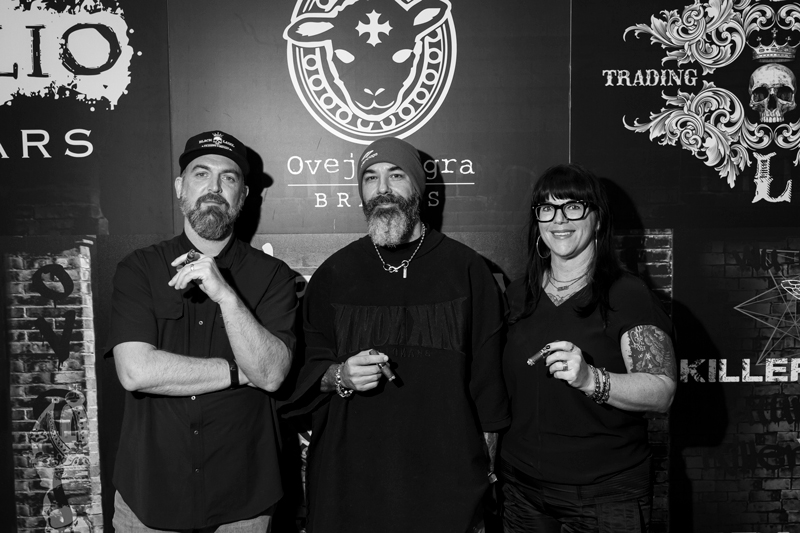
By 2015, the Browns were all-in on their new business. They decided to relocate their entire family to Estelí, Nicaragua, to be closer to all of the processes and people responsible for crafting their cigars. With this move, the Browns also decided to take their investment in the cigar industry one step further by starting their own cigar factory.
“We realized early on that if we wanted to make the cigars that we wanted to make, if we wanted the quality to be what we wanted it to be, if we wanted to be able to do the artistic styles of things that we wanted to do, then we had to control every step of the process,” James explains. “We couldn’t rely on anyone else to fulfill that. We both felt that if this is a product we’re making and putting our name on, we need to be responsible for the whole thing. Doing the factory was definitely a huge undertaking when we did it, but it was the right step and definitely what we needed. We needed that control.”
“It was pretty wild, moving to Estelí where there were really no other expat families to connect with. It was just us and the factory,” Angela recalls. “It was a huge undertaking. Living in Estelí was very different culturally from what we were used to, but we loved it. It’s been great. We love having our home base here.”
The factory, named Fabrica Oveja Negra, is another expression of the Browns’ creativity and desire to do things differently. “The ‘artistic’ approach, art, artisanal—these are not just keywords. They are part of our lifestyle and what the factory represents,” Angela explains. In addition to handling their production at Fabrica Oveja Negra, the factory also produces cigars for Dissident Cigars and Emilio Cigars and has taken part in collaborations such as one with Black Star Line Cigars for the Rosewood 1923 cigar.
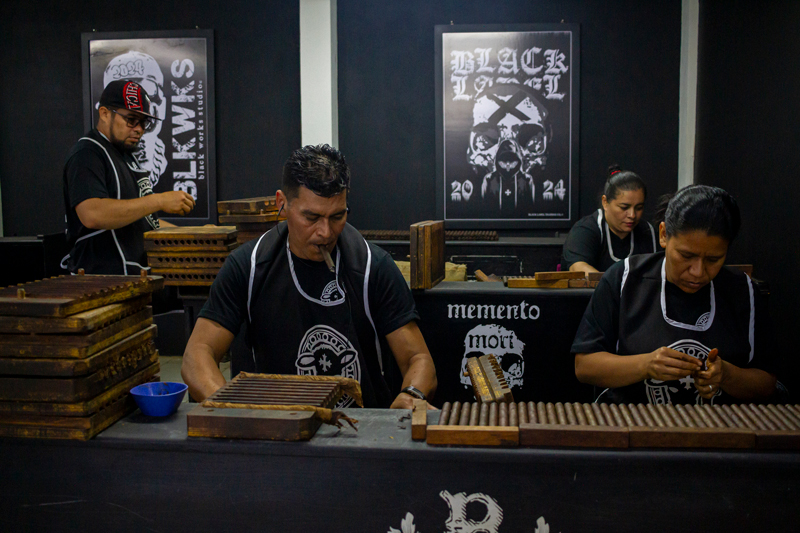
The exterior of the factory looks traditional, but once you step inside the doors of Fabrica Oveja Negra, you notice and feel the difference. When the original building was purchased, it was just dirt floors and a roof. The Browns treated this space like a canvas and made it their own, building it out to match their style.
“Everything’s black and white,” Angela describes. “There’s lots of artwork on the walls. At the back of the space, we have a really beautiful lounge that represents a lot of our travels and things that inspired us and some of the designs and artistic approaches we’ve taken with our logos.”
James adds, “Overall, our factory is not like any other factory for a lot of reasons. Like Angela said, when you walk into our factory, it’s very much us. It is the brands you get, the feeling you get, the concept. I think it’s a very modern factory in terms of the way that we’ve set it up and the things we do.”
One area of the factory the Browns are especially proud of is the aging room, which looks more like a wine cellar than the aging room you may encounter in another factory. Regarding the design and vibe of Fabrica Oveja Negra, the Browns’ design choices all serve a specific purpose. “It’s very important to work in a space that I find inspiring and beautiful,” says James. “Making cigars is my artistic outlet these days, and I want the factory to represent that in every way.”
Within the factory, the Browns have a dedicated group that has worked with them for well over nine years. The relationship the Browns have forged with Fabrica Oveja Negra’s workers is more familial than between boss and worker. The factory’s production manager, Armando Leiva, has become part of the Browns’ extended family. It is Leiva whom James studied under when he first decided to get into the cigar business, and it was Leiva who made the suggestion to the Browns that they start their own factory and offered to help make it happen.
The Path Forward
While the Browns have had to scale their operation over the years as more cigar enthusiasts have taken notice of the business, one thing has remained constant: Being different and doing things differently remains at the core of their business.
This year, the company has introduced a new brand to the market—Orthodox, a full-strength Maduro cigar with a dark Mexican San Andrés wrapper, an Ecuadorian Habano binder, and all-Nicaraguan fillers. Black Label Trading Company has also gotten into the small cigar market with the release of Coffin Nails, a petit corona with a dark Ecuadorian Habano Maduro wrapper, a Honduran binder, and fillers from Nicaragua and Honduras. The recently released limited edition Intergalactic Event Horizon offers cigar smokers a layered, full-bodied experience with a complex flavor profile that includes dark fruits, raisins, earth and star anise notes. These cigars have hit the market with anticipation and interest, a far cry from the beginning of the Browns’ foray into the tobacco industry when they had to plead with retailers to take in their products.
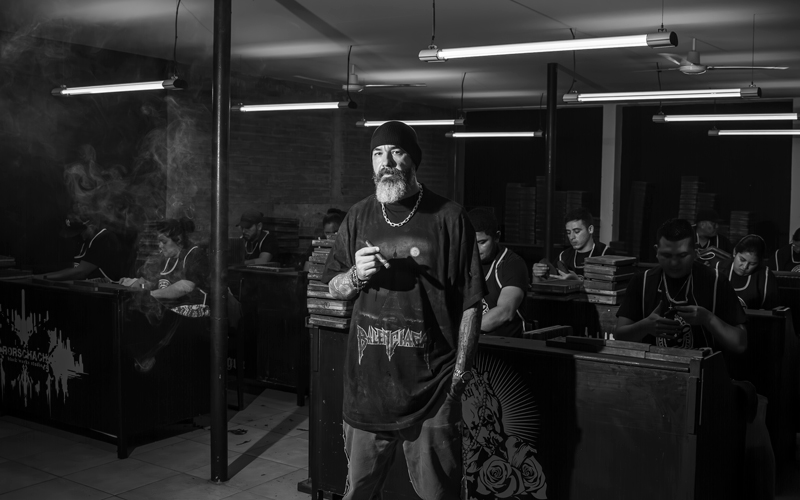
“When we first started, this whole idea of doing things differently was a struggle for a lot of people because things have been done the same way forever,” says James. “To see the transition of retailers not really understanding what this is all about to being 100 percent into it and on board and loving what it’s all about—that’s been really cool for me to see.”
James and Angela Brown are humbled by how their very different cigar brand and business have been accepted and embraced by cigar smokers around the world. Suppose you smoke just a select number of cigar brands. In that case, James hopes one is from Black Label Trading Company, Black Works Studio, and Fabrica Oveja Negra. With the 10th anniversary of the factory opening and release of Black Label Trading Company’s Morphine brand quickly approaching, the Browns are more interested in looking ahead than behind them and vow that no matter how much time passes, you can always expect something different when you light up one of their cigars.
– Photography by Justin Hunter/Black Label Trading Co. Story by Antoine Reid, content director at Premium Cigar Association (PCA). You can reach him at antoine@premiumcigars.org.
This story first appeared in PCA The Magazine, Volume 4, 2024. To receive a copy of this magazine, you must be a current PCA member. Join or renew today at premiumcigars.org/membership.

